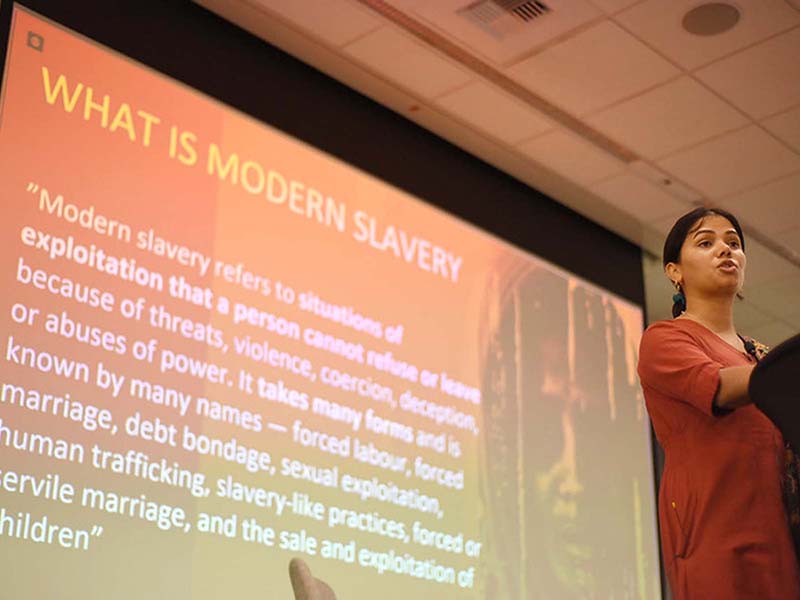
As the world grapples with the impacts of a global pandemic with women on the frontlines, the Generation Equality Forum (GEF) offers a once-in-a-generation opportunity for actors around the globe, including the private sector, to come together to build an ambitious agenda to empower women and girls. BSR, The B Team, and Women Win/Win-Win Strategies are working together to engage the private sector in making meaningful commitments to promote gender equality at the Forum. We connected with BSR member PayPal to hear more about its role as a GEF Action Coalition Lead and what motivated it to take part in the Forum.
There’s been a lot of excitement for the Generation Equality Forum, for which PayPal is a private sector lead. Can you tell us more about the Forum and why companies should engage?
The Generation Equality Forum (GEF) is a civil society-centered, multi-stakeholder global gathering for gender equality. Part of the Forum includes the launch of six innovative and multi-stakeholder Action Coalitions. The Action Coalitions engage governments; women’s, feminist, and youth-led organizations; international organizations; and the private sector to catalyze collective action, drive increased public and private investment, and deliver concrete, game-changing results.
PayPal is proud to be a private sector leader in the Action Coalition on Economic Justice and Rights. We believe there’s a strong case for other companies to join us and engage with the GEF.
First, engaging with the GEF is an efficient way to send a strong message to your investors, board, customers, government stakeholders, and employees that your company is committed to ESG outcomes for a more just, equitable, and prosperous future.
Second, without the expensive membership fees of many global communities, your employees will have an opportunity to engage with a dynamic, multi-stakeholder set of actors jointly dedicated to turbo-charging practical change in the world on gender equality and the rights of women and girls. You can join others at global and regional events to amplify the Commitment Maker’s role and contribution in accelerating results on the SDGs.
Third, it is a unique learning exchange and collaboration opportunity across the Global North and Global South. You can learn about what works to advance change on gender equality and women's and girls’ rights. Once you develop the muscles of gender equity, you can cross-apply this acumen to other types of equity and diversity, whether it’s race, religion, sexual orientation, disability, or beyond.
And this is on top of the deep, evidence-based, and data-driven business case. Gender equality is a critical component when considering that closing the gender gap could increase global GDP by 35 percent.
Why has PayPal chosen to engage with GEF and the Economic Justice Action Coalition?
At PayPal, we believe that now is the time to reimagine money and democratize financial services. Every person has the right to participate fully in the global economy. We feel an obligation to empower people to exercise this right and improve financial health. As a leader in digital financial services, we believe in providing simple, affordable, secure, and reliable financial tools and digital payments. With this company mission, it was a no brainer for PayPal to apply to serve on the leadership group of the Action Coalition on Economic Justice and Rights.
I was barely six weeks into my new role when I pitched the opportunity to PayPal senior leadership. It was a Friday night, and before Monday morning, I received not only a green light, but also strong support from our senior leaders (including our President and CEO, Dan Schulman) to submit our letter of interest. We are honored to have been selected to serve on the leadership group of this Action Coalition and to be among a small group of private sector companies that are engaged in the overall Generation Equality Forum.
Advancing gender equality, specifically on the topic of Economic Justice and Rights, is not new to PayPal. We have pursued opportunities to improve outcomes across our stakeholders, including our employees, consumers, merchants, and supply chains. We have made progress in areas like gender pay equity and championing policies that promote workplace and economic equality for women. We are excited to explore the potential of leveraging our products, data, and platform for further impact.
The decision to get involved aligns with our values as an organization and allows us to bring focus and prioritization to the urgency of the gaps, especially as we all strive to overcome the setbacks of the COVID-19 pandemic.
Engaging with the Generation Equality Forum is an efficient way to send a strong message to your investors, board, customers, government stakeholders, and employees that your company is committed to ESG outcomes for a more just, equitable, and prosperous future.
What kind of recommendations are the Action Coalitions making?
Launched at the Mexico City Generation Equality Forum, the draft Action Coalitions Global Acceleration Plan includes recommended actions, and you can add your thoughts to influence the objectives of the Action Coalitions.
To give you an example, one of the four subthemes of the Action Coalition on Economic Justice and Rights is on productive resources. Namely, the Economic Justice and Rights Action Coalition urges action to expand women’s access to and control over productive resources through increasing access to and control over land, gender-responsive financial products and services, and the number of firms owned by women by 2026. Under this action, we've identified three strategies to advance this ambitious goal:
- First, we must eliminate gender-discriminatory policies, adopt and implement laws and policies, and ensure strategies and investments are underway that realize women’s and girls’ access to and control over productive resources and assets.
- Second, we must support platforms representing women’s groups and scale infrastructure that measurably expands women´s access to and use of productive resources, including affordable capital, financial services, digital products, internet, energy, and equitable access to government services and benefits.
- And third, we must identify and challenge harmful social norms, stereotypes, and practices impeding women and girls from equitably controlling and benefiting from productive resources while fostering positive attitudes validating women’s empowerment and economic contributions.
I really want to emphasize the unique and far-reaching impact of the digital opportunity. Gender-intentional investments in digital payment and ID infrastructure are key to building forward, differently. We imagine more inclusive, resilient, and gender-intentional financial systems that enable women's financial inclusion and women's economic empowerment. Digital payments help women manage time poverty, give women agency, and provide more privacy and increased safety than cash.
Gender-intentional investments in digital payment and ID infrastructure are key to building forward, differently. We imagine more inclusive, resilient, and gender-intentional financial systems that enable women's financial inclusion and women's economic empowerment. Digital payments help women manage time poverty, give women agency, and provide more privacy and increased safety than cash.
These Action Coalition commitments sound inspiring. How are companies thinking about the commitments they can uniquely contribute to support the Generation Equality Forum outcomes?
In a panel hosted by The B Team, BSR, and Women Win/Win-Win Strategies to explore how companies can accelerate gender equality, Celine Bonnaire (Kering Foundation) and Michelle Milford Morse (UN Foundation, Girls and Women Strategy) joined me in a clarion call for the private sector to seize this moment.
The ask is to do something, and the opportunity to draft your corporate commitment is now. The private sector has so much to gain by participating, and we have an astounding level of capital, well beyond the financial commitments when we engage our employee base, our consumer base, and our collective might.
I would push us to think creatively about our different types of capital. For example, the private sector can leverage other types of capital beyond financial capital to help women businesses grow.
- Network capital—we can help women-owned businesses get to market
- Human capital—we can form partnerships to mobilize capacity building of skills specific to their business models and sectors
- Intellectual capital—we can enable technical assistance to support evidence-based and data-driven decision-making
- Reputation capital—we can share the halo of our brands and voice
I would also leverage the Generation Equality Forum to be the action-forcing enabler to not only put gender equality on the list of company priorities, but also to raise it to the top of the list. Create urgency with fear of missing out on this global movement. Mobilize your employees and customers so the decision-makers say yes quickly to unleash funding, evolve policies and processes, sex-disaggregate the data, and mainstream gender transformational interventions.
There are multiple ways for interested companies to get involved in the Generation Equality Forum. This includes: becoming a Commitment Maker; participating in the Generation Equality Forum Public Conversation; and taking part in the Paris Generation Equality Forum (June 30-July 2).
BSR’s latest sustainability insights and events straight to your inbox.
Topics
Let’s talk about how BSR can help you to transform your business and achieve your sustainability goals.








